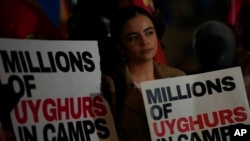Members of the Uyghur diaspora are welcoming a U.S. State Department report on China’s efforts to manipulate global opinion regarding its western Xinjiang region but say Beijing’s approach is not new.
“We have been highlighting China’s disinformation campaign on the Uyghur genocide for many years,” Rushan Abbas, executive director of the Washington-based Campaign for Uyghurs, told VOA.
“It’s great to see the State Department finally recognizing the extent and depth to which this is happening and confirming with this timely report,” she added.
The report, released Wednesday, accuses China of seeking to “drown out,” marginalize and harass those who are critical of Beijing’s treatment of Uyghurs.
Titled PRC Efforts to Manipulate Global Public Opinion on Xinjiang, it says Beijing is actively attempting to dominate global discussions on Xinjiang and discredit reports from independent sources.
According to the report, the tactics Beijing has used amount to “digital transnational repression.” It lists trolling and cyberbullying as methods to silence dissent. China is also accused of denying criticism from independent media sources by amplifying “positive stories … to counter accusations of genocide and crimes against humanity.”
The State Department report also alleges that China uses “whataboutism” and false equivalencies, meaning it says other countries are just as guilty of human rights abuses to distract from criticism.
“PRC messaging tactics seek to drown out critical narratives by both flooding the international information environment to limit access to content that contradicts Beijing’s official line, and by creating an artificial appearance of support for PRC policies,” the report said. “Messengers use sophisticated A.I.-generated images to create the appearance of authenticity of fake user profiles,” the report said, referencing the use of artificial intelligence.
Many Western governments and human rights groups accuse China of genocide, forced labor and arbitrary detention of 1 million Turkic Muslims, largely Uyghurs, in reeducation camps.
China’s response
China has repeatedly denied the accusations and has said the facilities are vocational education and training centers aimed at deradicalizing “trainees” and countering terrorism.
In June, a U.S. law known as the Uyghur Forced Labor Prevention Act went into effect, aimed at scrutinizing and banning imported goods from the Xinjiang region unless there is “clear and convincing evidence" that no forced labor is involved.
Forced labor and genocide of Uyghurs in Xinjiang “are nothing but vicious lies concocted” by anti-China forces, said a Chinese Embassy spokesperson in Washington, Liu Pengyu.
“The US side keeps using Xinjiang-related issues to create rumors and make trouble,” Liu wrote in an email to VOA.
“It is the US government that has been spreading false information and lies. What China is doing is telling the world the truth about China's Xinjiang region,” he said.
Uyghur diaspora’s response
Campaign for Uyghurs, through its advocacy work in educating the public about China’s repression of Uyghurs, has been fighting Beijing’s disinformation campaign daily, said Abbas.
“I hope this report wakes the public up and makes them think twice before they read anything coming out of China regarding the camps and [the] Uyghur situation,” Abbas said. “I urge everyone to independently read and research about the largest internment of a people since the Holocaust.”
Abbas said her sister was arbitrarily detained by the Chinese government in Urumqi, the capital of Xinjiang. Abbas has lost all contact with her sister since her detention.
“I am living through this every day. My own sister has been suffering in these camps with no end in sight for the last four years,” Abbas said. “I am just one of the victims out of the millions of Uyghurs around the world trying to seek freedom for our loved ones.”
According to Salih Hudayar, founder of the Washington-based East Turkistan National Awakening Movement and prime minister of the East Turkistan Government in Exile, the Chinese disinformation campaign has targeted not only Xinjiang but also other regions in China.
“China has actively been manipulating global public opinion on the facts about East Turkistan, Tibet and other countries occupied by China,” Hudayar said. “In light of this report, we hope the U.S. government takes concrete measures to push back against China's efforts to manipulate facts regarding East Turkistan.”
Most Uyghurs in exile prefer to use the name East Turkistan instead of Xinjiang, which is a name given to the region by China’s government in the 1800s.
In recent years, some U.S. social media companies such as YouTube and Twitter have begun labeling state-controlled media accounts and have announced the removal of fake accounts suspected of being related to the Chinese government.
Hudayar said more needs to be done and is asking the U.S. government to pressure social media platforms to prevent Beijing from using these digital outlets to engage in disinformation campaigns and cyberbullying of China critics.
“We also urge the U.S. government to counter China's false narratives by supporting East Turkistani entities, including the East Turkistan Government in Exile and the East Turkistan National Awakening Movement, and their efforts to promote the truth about East Turkistan and China's ongoing genocide of Uyghurs and other Turkic peoples,” Hudayar said.





